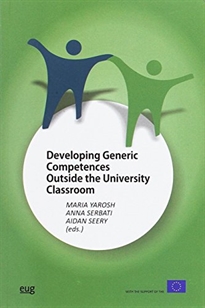
-
35,21
USD
-
* Free shipping to US.
-
-
In stock
Features:
- Pages: 328
- Format: 21x14 cm
- Edition Date: 2017
- Edition: 1
- Language: Inglés.
- Binding: Tapa blanda o Bolsillo.
- Editorial: EUG
-
Developing generic competences outside the university classroom
-
9788433860156
-
-
-
-
-
-
Developing Generic Competences Outside the University Classroom What do we give credit to? What do we recognise nowadays and how? A useful book which draws attention to the increasingly-blurred borders between formal, non-formal and informal learning. Inspiration also for those educators NOT involved in the university system! Mark Taylor, Trainer, writer and editor of Coyote and Tools for Learning online magazines What does it take nowadays to be actually competitive in a world which runs fast and changes even faster? This book offers to higher education students various instruments to understand and develop competences even through non-formal learning, which on top of academic knowledge can contribute to their all-around growth Enrico Marchetto, Students' representative, Galilean School of Higher Education, University of Padova This book is particularly interesting in the way it defines and describes how generic competences (very well presented in the second part) can be acquired at universities using various forms of non-formal learning. Many universities will probably recognize some of their activities in those described in the first 8 chapters. What I personally found very important is chapter 9, which shows how non-formal learning can become recognized in the same way as other formal learning activities. This book will be valuable to all higher education program developers. Professor Vincent Wertz, Université Catholique de Louvain, Chair, Education Innovation Working Group, Coimbra Group of Universities This publication highlights some of the benefits of voluntary engagement in non-formal learning. It is a thrilling thought that more universities and other actors might come to see the value of such engagement, remarkable though it might sometimes seem. I am convinced that the experiences acquired by exposing yourself to the challenges that can arise from voluntary engagement in non-formal learning will be of value for the rest of your life. It is therefore a true pleasure to see that this is gaining recognition. Adam af Ugglas, President/First Curator of Stockholms nation, Uppsala Very welcome, a publication that makes the learning of generic competences - so important for a sustainable society - a central concern. Competences which are still developed largely outside the class room. This requires a clear framework, crucial for recognition purposes, which is now offered to us. Robert Wagenaar, Director International Tuning Academy
-
35,21
USD
-
* Free shipping to US.
-
-
In stock
The book belongs to the following catalogs
Other books in the subject Universidades:
-
33,55
USD
-
28,29
USD
-
34,38
USD
-
28,63
USD
-
39,35
USD
-
28,51
USD